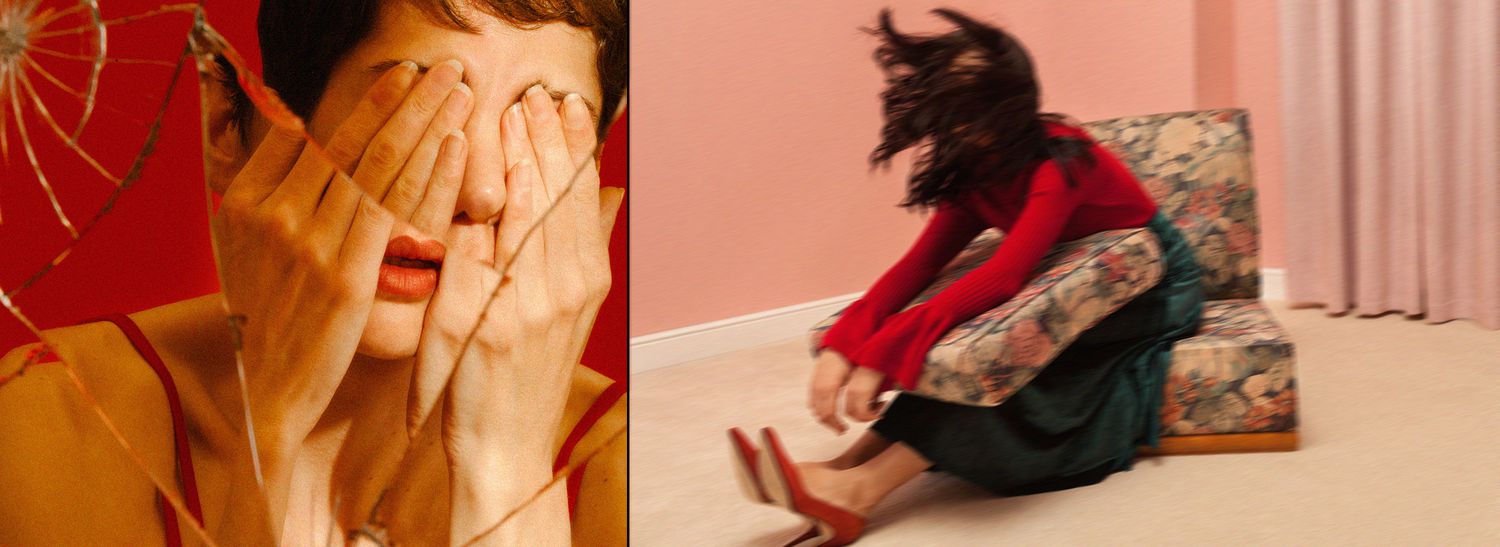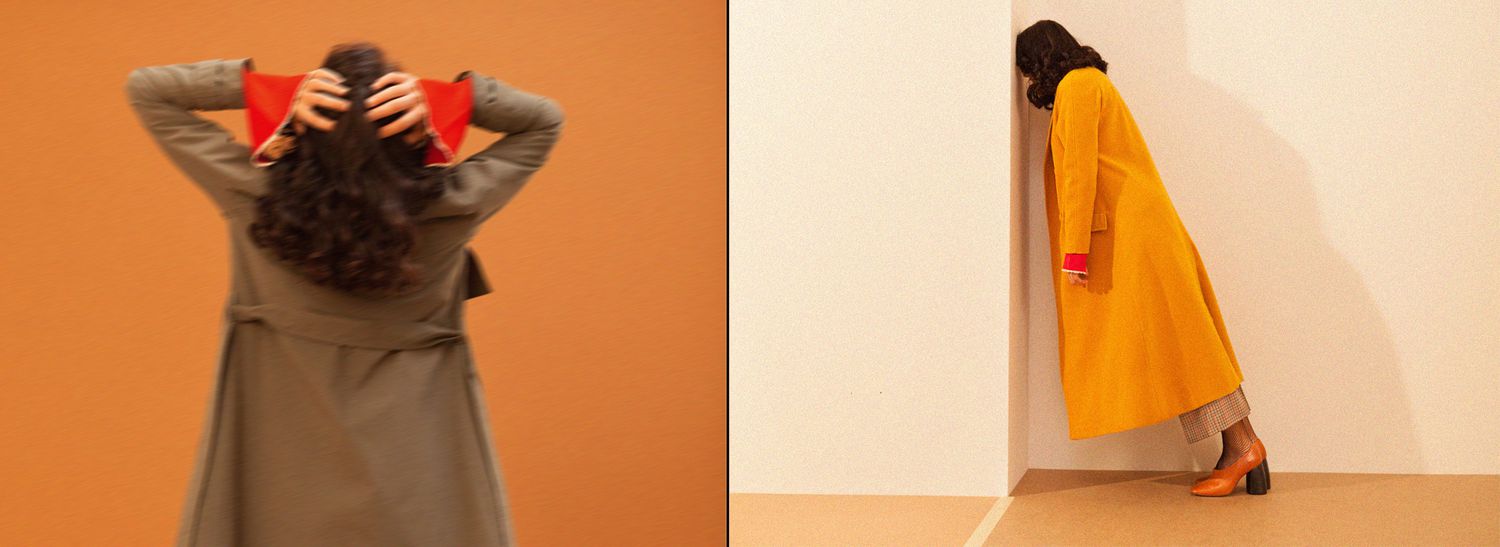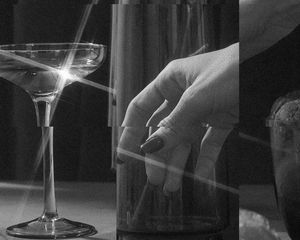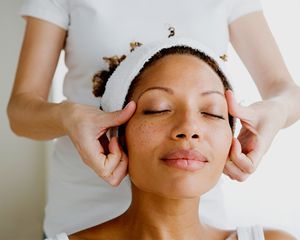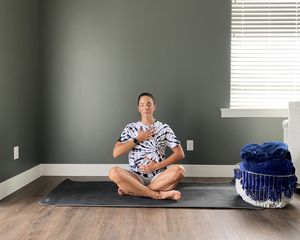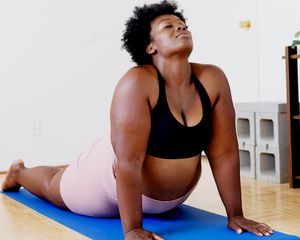Last year on Christmas Day, I had my first panic attack. I didn’t know it at the time; there was no reason to be “panicked”. The holiday was flanked with joyous celebrations, healthy family members, carol-singing, delicious food—by all accounts, I was holly jolly. But shortly after arriving at my father-in-law’s house, my vision began to distort, and I suddenly felt woozy. I quickly went upstairs, fearing something awful was about to happen, and sat on the bed. My heart was pounding, my extremities were tingling, and my head was spinning with racing thoughts: Am I having a stroke? What if I have to go to urgent care—is it even open on Christmas? How embarrassing will it be if my husband has to carry me out of here in front of his family? After a few hours of resting and distracting myself on TikTok, I felt almost back to normal and resumed the festivities, albeit cautiously.
In the days after, the symptoms came in waves, so I went to the ER to get a full workup. After several tests that all came back negative, the doctors chalked up my situation to a “transient viral infection” and assured me it would move through my system within a few days. Dissatisfied, I turned to the internet. Between the usual search results of life-threatening illnesses and rare diseases were suggestions of something less physical and more mental. “Panic attacks” and “Generalized Anxiety Disorder (GAD)” flashed back at me on my screen, like someone fervently waving both hands in front of my face. Could all this be anxiety? Sure, I had a lot going on at work; I was about to take on a new role and more responsibility than I’ve ever had, but the stress associated with these changes didn’t seem substantial enough to spin my nervous system out of orbit. Or so I thought.
Stocksy/Design by Tiana Crispino
When I returned to work after the holiday break, my symptoms ballooned. A routine Zoom meeting would make my palms sweat and my heart race. One day, I had to lead a presentation in front of the C-suite, and panic radiated through my body like nagging lightning bolts. The causality couldn’t have been clearer: Stress was having a massive impact on my psyche, but I couldn’t grapple with this new reality. It didn’t make sense. I prayed for high blood pressure or an overactive thyroid instead of a mental condition—both could be easily treatable; anxiety would not, I reasoned. I sought a cardiologist’s opinion who had me wear a monitor to track my heart’s activity over the course of a week. When I came back for the results, he noted that all looked normal, save for a short period where my heart rate jumped to 185 beats per minute, a rate higher than if I were sprinting at full capacity on a treadmill. I laughed—the time stamp matched perfectly with the moment I gave my presentation. Each doctor’s visit was forming a pattern; my body was otherwise healthy, so anxiety was, whether I could accept it or not, the final piece of the puzzle.
I’m certainly not alone when it comes to having an anxiety disorder—over 40 million U.S. adults were diagnosed with one in 2017. After the pandemic hit, rates of anxiety and depression grew 25% in the first year. Though the commonality of my new situation didn't soften the blow, it somehow held a magnifying glass to my symptoms. The fear of the unknown was suffocating. I felt like a bystander in my own life, watching the racing thoughts and sadness wash over me like a tidal wave. Some nights, I’d wake up in a pool of sweat at 3 a.m. and feel like I was losing my mind. Others, I’d have to excuse myself from dinner with my husband to go cry in the bathroom. I often found myself scrolling through my camera roll and studying the face of the person staring back at me before the holidays—how was I so different then, and why is this happening? I became jealous of the person I was before the anxiety.
The most frustrating part was the inability to pinpoint the source; work was a piece of it, but I knew it wasn’t the whole pie. Sweaty palms and shallow breathing would randomly come about while eating dinner with family or during a drive to the store on an otherwise normal, low-stress day. That’s the thing about GAD, though—there isn’t always a clear problem at hand. Explains Joanne Frederick, NCC, LPC-DC, VA, LCPC-MD, “Someone can be sitting at the beach, engaging in what seems to be a relaxing activity, and although they may not be consciously anxious about anything in the moment, there are thoughts in their subconscious—or perhaps emotions that they chose not to readily access—that can cause anxiety and its symptoms even though the setting itself does not pose any real ‘danger’. The body and mind can still react in the fight-or-flight stage.”

Stocksy/Design by Tiana Crispino
After weeks of not getting a full night’s sleep, canceling plans, and struggling to function at my usual capacity, I finally booked an appointment to talk about taking an SSRI. The physician had me answer a survey of questions and, after diagnosing me with severe anxiety, wrote me a script for Prozac. I took my first dose and experienced essentially all the common side effects, including nausea, vomiting, heightened anxiety, and loss of sleep. Anxiety medication has done wonders for so many people and these side effects often go away with a dosage adjustment or just with time, but I was spooked by my body’s reaction. I decided to give therapy a try and return to the medication if needed. According to Christina Furnival, LPCC, while research tells us that medication in combination with therapy is the most effective treatment for anxiety disorders, symptoms can improve with therapy alone.
Regularly speaking with a therapist has been, in short, life-changing for me. They’ve given me so many valuable tools such as how to “lean into anxiety” and how to examine why symptoms are coming on at the moment rather than pushing them away. My therapist also uses CBT (Cognitive Behavioral Therapy) to help me reframe negative thoughts. We’ve unearthed deep-seated triggers that I didn’t realize were percolating beneath the surface and dissected areas of my life in ways I’d never considered. I still have a lot of work to do, but almost five months after the onset of my anxiety, I feel like I’ve summited the mountain and am heading back to flat ground.
If you’re going through a sudden onset of anxiety and panic, I spoke to a few experts for advice on how to navigate this difficult time. Read their thoughts below.
What are the symptoms of a panic attack?
If I’d known that my Christmas Day symptoms were that of a panic attack, I wouldn’t have sent myself into an even further health-anxiety spiral. “Common symptoms are a pounding or racing heart; sweats; chills; feeling faint, dizzy, or weak; and shortness of breath,” says Awstin Gregg, LCSW and CEO at Connections Wellness Group. Symptoms typically last 30 minutes or more, peaking at around 10 minutes. There’s also a difference between a panic attack and an anxiety attack, Gregg notes. With an anxiety attack, your body is gradually beginning to worry about an upcoming situation and is anticipating a negative outcome. This may be accompanied by rapid heartbeat, chest tightness, etc. However, with a panic attack, the symptoms are sudden and more debilitating in nature, he says. Both can occur in tandem: You can feel anxious about a situation, and then sense imminent danger and experience a panic attack.
What are some things you can do to find the source of your anxiety?
Gregg says it is highly recommended that you speak with a therapist to help narrow down the cause of your symptoms. If you’re unable to see someone, he says that meditation and mindfulness techniques “provide an intentional space for someone to reflect on what might be causing their anxiety.”
Joanne Frederick, LMHC, encourages you to look for patterns: “Is it around travel? Socializing? Public speaking? Meeting with superiors at work? Arguing with a significant other? Meeting new people? Juggling several tasks at once? Financial worries? Being alone?” She says that keeping a journal and tracking these events may help signal a common denominator. Additionally, Frederick says that interpreting your dreams may also help you figure out the most troubling stressors that are contributing to your anxiety and panic.

Stocksy/Design by Tiana Crispino
Can you prevent panic attacks from happening or reduce the symptoms when you're on the brink of one?
“Our autonomic nervous system is all or nothing, meaning that if we can turn off a component of it, the entire system responds,” explains Furnival. “So when the sympathetic nervous system kicks into gear—this is your body’s fight-or-flight response—we may be able to cut off the panic attack’s trajectory by quickly engaging in deep breathing and grounding techniques that initiate the parasympathetic nervous system, calming you down.” She recommends practicing deep breathing and reciting affirmations when you’re not having a panic attack so you’re primed and ready if and when the real thing happens. She also notes that trying to avoid a panic attack and being fearful of one can ironically increase its frequency (so, as my therapist recommended, lean into the attack and acknowledge that it’s happening). “If we can engage in deep breathing and repeat phrases like, This is a panic attack and it will end soon or I am having a panic attack and I will be okay, we find that we can handle panic attacks, as awful as they are and feel.”
If you experience a panic attack at one point in your life, is it guaranteed to come back?
Anxiety is not a life sentence. Especially if the anxiety stems from a particular event like a death in the family or a divorce, over time, the symptoms generally eventually subside. “If [someone] has never had anxiety prior to that event, the chances are good that the anxiety was very circumstantial and that they do not have an anxiety disorder—they simply went through an anxiety-provoking time, reacted accordingly, and recovered,” says Frederick. If you do have an anxiety or panic disorder, however, your body will likely continue to respond in the same way. However, she says that individuals engaged in the therapeutic process are much more likely to experience longevity of decreased symptoms than those that do not. And if panic attacks are severe, regular, and impeding your life, you can speak with a psychiatrist or general practitioner about prescription medication intervention.
:max_bytes(150000):strip_icc()/BYR_Q2DI_LandingPage_RECIRC-ace1277af31a44bca13bfc50292e9c1d.jpg)
:max_bytes(150000):strip_icc()/BYR_Q2DI_BSide_RECIRC-ec8f821a679c4d9daecd60ae0927811c.jpg)
:max_bytes(150000):strip_icc()/recirc3-3f65304df82f42999156198f07b1a1d3.jpg)
:max_bytes(150000):strip_icc()/recirc1-bcc9a40911124cf788a7763584a28fbd.jpg)
:max_bytes(150000):strip_icc()/recirc5-Stocksy-6789e94c026f41c99b2f56eb35a03352.jpg)
:max_bytes(150000):strip_icc()/recirc-Unsplash1-ed96fff0ddae46568f99861e1dac4a00.jpg)
